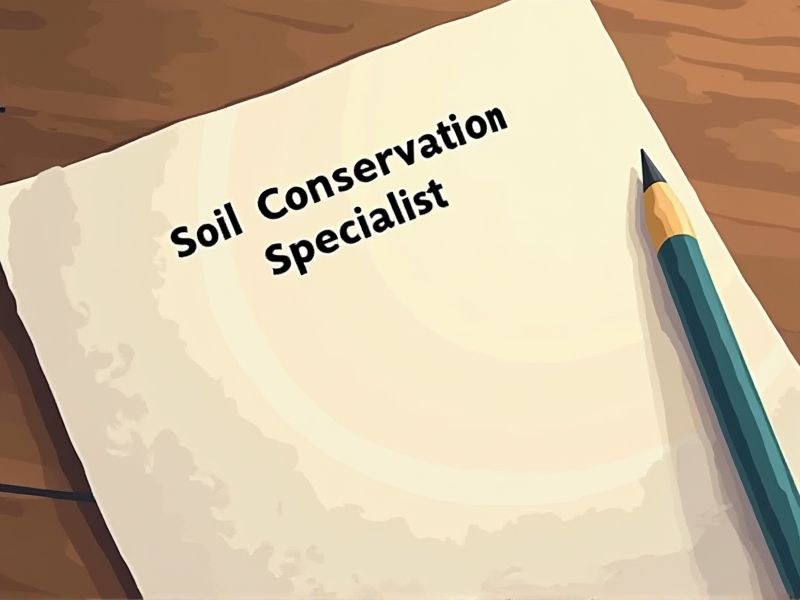
Soil Conservation Specialists play a critical role in ensuring sustainable land management and preventing soil erosion. Obtaining specific certifications equips them with the advanced knowledge and skills necessary to tackle complex environmental challenges effectively. Certifications also validate their expertise, which can enhance professional credibility and career opportunities. The following are some important certifications essential for Soil Conservation Specialists.
Certified Professional Soil Scientist (CPSS)
Increasing concerns over soil degradation and agriculture's sustainability necessitate expertise from Certified Professional Soil Scientists (CPSS), ensuring informed decisions in soil conservation. CPSS certification demonstrates a high level of knowledge and practical skills in soil management, crucial for effective implementation of conservation strategies. The complexity of soil ecosystems requires specific technical understanding, which CPSS professionals provide, to address issues such as erosion and nutrient management. Effective conservation often relies on the ability to analyze soil data accurately, a skillset that CPSS training specifically develops and refines.
Certified Crop Adviser (CCA)
Certified Crop Advisers (CCAs) possess specialized knowledge in soil health, which directly impacts the effectiveness of soil conservation strategies. Their expertise in sustainable farming practices can lead to decreased soil erosion. They understand crop rotations and nutrient management, aiding in long-term soil fertility. With a CCA's guidance, farms can improve overall yield while maintaining environmental integrity.
Certified Professional Agronomist (CPAg)
Having a Certified Professional Agronomist (CPAg) as a Soil Conservation Specialist ensures the implementation of evidence-based practices to maintain soil health and fertility. The CPAg's expertise in crop management and sustainable land use directly influences soil erosion rates and nutrient preservation. Their knowledge of integrated pest management can prevent soil degradation caused by chemical overuse. The CPAg credential supports compliance with environmental regulations, reducing legal risks for agricultural operations.
Natural Resources Conservation Service (NRCS) Certification
NRCS certification equips a Soil Conservation Specialist with the standardized knowledge and skills required for implementing effective soil conservation practices. It ensures that specialists adhere to federal guidelines and policies, which is crucial for maintaining ecological compliance. Certification validates a specialist's expertise, fostering trust among landowners and stakeholders who rely on their assessments and recommendations. Achieving NRCS certification often results in enhanced career opportunities and professional growth within the conservation sector.
Soil Health Specialist Certification
A Soil Health Specialist Certification equips a Soil Conservation Specialist with up-to-date knowledge on sustainable practices, leading to more effective soil management strategies. This certification validates expertise and fosters trust with stakeholders who prioritize environmental stewardship. Enhanced skills from certification enable specialists to better measure, monitor, and improve soil quality, directly impacting conservation efforts. With certified skills, specialists can implement innovative solutions to combat soil degradation, which is increasingly critical in the face of climate change.
Watershed Management Certification
Watershed Management Certification equips Soil Conservation Specialists with the necessary knowledge to address complex water-soil interactions effectively. With a certification, they can implement evidence-based practices that prevent soil erosion and enhance water quality. Certification ensures specialists are up-to-date with the latest sustainable management techniques, vital for environmental health. Without comprehensive watershed strategies, soil conservation efforts may be less effective in mitigating land degradation.
Geographic Information Systems (GIS) Certification for Environmental Management
Soil Conservation Specialists often need GIS Certification for effective visualization and analysis of spatial data, which enhances the understanding of soil erosion patterns. GIS tools enable the precise mapping of land use changes, aiding in the development of targeted soil conservation strategies. Improved data integration through GIS facilitates better decision-making by combining soil, weather, and topographic data. The certification provides specialists with advanced skills to predict and model environmental impacts, ensuring sustainable soil management practices.
Environmental Impact Assessment (EIA) Certification
Environmental Impact Assessment (EIA) Certification provides Soil Conservation Specialists with the necessary framework to evaluate potential ecological disruptions resulting from land use changes. This certification equips specialists with standardized methodologies to predict and mitigate soil degradation and erosion effectively. By adhering to EIA guidelines, specialists can ensure that soil conservation strategies align with sustainable development goals and regulatory requirements. EIA Certification enhances the credibility and effectiveness of soil conservation practices in preserving soil health and ecosystem services.
Sustainable Land Management Certification
Sustainable Land Management Certification equips Soil Conservation Specialists with evidence-based practices to prevent land degradation. Certified specialists gain access to the latest tools and techniques, ensuring more effective erosion control and soil preservation. As land management practices become increasingly complex, certification provides standardized knowledge for consistent implementation. Certification builds credibility, fostering trust among stakeholders and promoting collaborative efforts towards sustainable land use.
Environmental Management Systems (EMS) Lead Auditor Certification
Possessing an EMS Lead Auditor Certification enables a Soil Conservation Specialist to effectively assess compliance with environmental regulations, ensuring sustainable soil practices. When specialists gain expertise in EMS auditing, they can identify environmental risks related to soil conservation and implement corrective actions. Organizations often require EMS-certified professionals to enhance their credibility and engage effectively with stakeholders. Certified individuals contribute to strategic planning, promoting best practices in soil management and conservation efforts.
Summary
When you see a Soil Conservation Specialist acquire certifications, you can expect an enhancement in the credibility and value of their expertise. Enhanced skills in sustainable land management often lead to increased job opportunities as organizations seek qualified professionals. This certification typically results in more effective conservation practices, improving soil health and ecosystem balance. In turn, your projects may benefit from higher efficiency and better outcomes, ultimately fostering long-term environmental sustainability.
